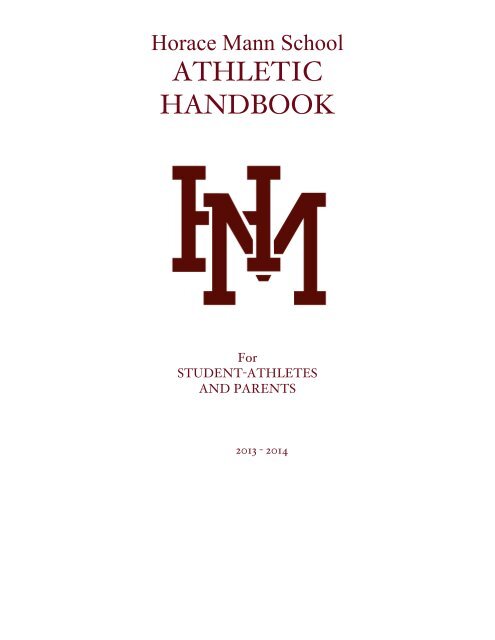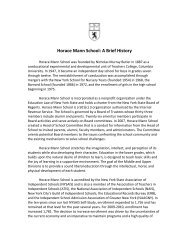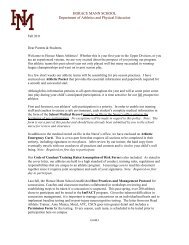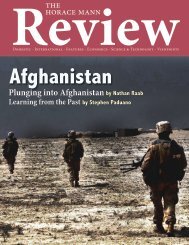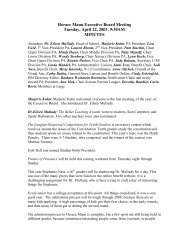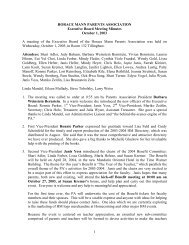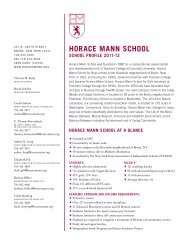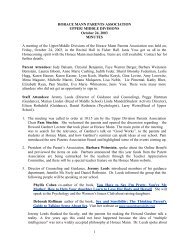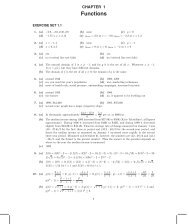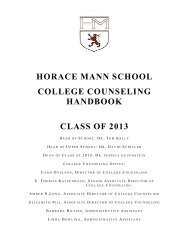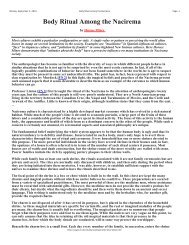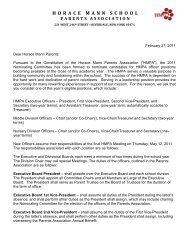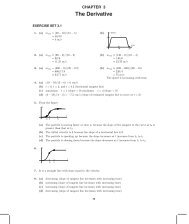ATHLETIC HANDBOOK - Horace Mann School
ATHLETIC HANDBOOK - Horace Mann School
ATHLETIC HANDBOOK - Horace Mann School
Create successful ePaper yourself
Turn your PDF publications into a flip-book with our unique Google optimized e-Paper software.
<strong>Horace</strong> <strong>Mann</strong> <strong>School</strong><br />
<strong>ATHLETIC</strong><br />
<strong>HANDBOOK</strong><br />
For<br />
STUDENT-ATHLETES<br />
AND PARENTS<br />
2013 - 2014
This handbook has been developed with the intent of helping to make<br />
interscholastic athletics at <strong>Horace</strong> <strong>Mann</strong> as simple, effective, and as enjoyable as<br />
possible. It is hoped that by assembling all the material that relates to the<br />
administration of athletic programs in one central volume, parents and student<br />
athletes will have a better understanding of these practices, policies, and procedures<br />
with a more convenient reference to them.<br />
This handbook is intended to clearly state and define methods for<br />
accomplishing specific tasks, to outline basic goals, and to recommend guidelines for<br />
the maintenance of high standards in the overall athletic program. It is also intended<br />
to be a practical tool that answers more questions than it creates and which parents<br />
and student athletes find to be a usable resource and not just another item to be filed<br />
away.<br />
This handbook is designed to supplement and not replace direct<br />
communication among all members of the athletic community. The Athletic<br />
Director will always be available to provide whatever assistance is required in pursuit<br />
of common goals.<br />
Finally, any suggestions you might have for improving this handbook or any of<br />
its content is welcome.
<strong>Horace</strong> <strong>Mann</strong> Athletics Page 1<br />
HORACE MANN <strong>ATHLETIC</strong> OFFERINGS<br />
FALL VARSITY JV MOD-A MOD-B<br />
Boys’ Cross Country X X<br />
Girls’ Cross Country X X<br />
Girls’ Field Hockey X X<br />
Boys’ Football X X X<br />
Boys’ Soccer X X X X<br />
Girls’ Soccer X X X<br />
Girls’ Tennis X X X<br />
Girls’ Volleyball X X X X<br />
Mixed Water Polo X X X (club)<br />
WINTER VARSITY JV MOD-A MOD-B<br />
Boys’ Basketball X X X X<br />
Girls’ Basketball X X X X<br />
Boys’ Fencing<br />
X<br />
Girls’ Fencing<br />
X<br />
Girls’ Gymnastics<br />
X<br />
Boys’ Squash<br />
X<br />
Boys’ Swimming X X<br />
Girls’ Swimming X X<br />
Boys’ Indoor Track<br />
X<br />
Girls’ Indoor Track<br />
X<br />
Wrestling X X X<br />
Boys’ Skiing<br />
X<br />
Girls’ Skiing<br />
X<br />
SPRING VARSITY JV MOD-A MOD-B<br />
Baseball X X X<br />
Boy’s Golf<br />
X<br />
Boys’ Lacrosse X X X<br />
Girls’ Lacrosse X X<br />
Girls’ Softball X X X<br />
Boys’ Tennis X X X<br />
Boys’ Track & Field X X<br />
Girls’ Track & Field X X<br />
Mixed Ultimate Frisbee<br />
X<br />
Boys’ Crew<br />
X<br />
Girls’ Crew<br />
X
<strong>Horace</strong> <strong>Mann</strong> Athletics Page 2<br />
PHILOSOPHY OF INTERSCHOLASTIC<br />
<strong>ATHLETIC</strong>S<br />
Interscholastic athletics at the <strong>Horace</strong> <strong>Mann</strong> <strong>School</strong> is a component of the<br />
physical education program where credit is given for completion of a sport season.<br />
Therefore, all policies governing academic requirements shall be extended to<br />
athletics. Participation in athletics promotes a positive self-image, development of<br />
physical, mental, and social skills, understanding of team cooperation, and a sharing<br />
of personal experiences.<br />
A well-coordinated program is vitally important to the morale of the school.<br />
Everyone involved in the delivery of athletics possesses a unique opportunity to<br />
teach positive life skills and values. Therefore this educational experience demands<br />
highly qualified coaches.<br />
Desire, dedication, and self-discipline need to be developed to ensure<br />
commitment and personal sacrifice required by athletics. Making such a<br />
commitment helps to nurture integrity, pride, loyalty and overall character. The<br />
final outcome is a better citizenry carrying these values throughout their lives.<br />
It is the nature of athletic competition to strive for victory. However, the<br />
number of victories is only one criterion for measuring a season’s success. Guiding<br />
the team to attain maximum potential is the ultimate goal to this end. The coaching<br />
staff must teach student athletes to prepare their minds and bodies to reach<br />
maximum potential, to be modest in victory and steadfast in defeat.
<strong>Horace</strong> <strong>Mann</strong> Athletics Page 3<br />
MODIFIED PROGRAM PHILOSOPHY<br />
A modified program is available to all students in the seventh and eighth<br />
grades. Sport activities offered are determined by the existence of leagues, student<br />
interest, and the relationship to the upper division program. It is a competitive<br />
program designed to meet the developmental needs of its participants. At this level,<br />
the focus is on learning athletic skills, game rules, fundamentals of team play, socioemotional<br />
growth, physiologically appropriate demands on the adolescent body and<br />
healthy competition.<br />
Coaches are instructed to make every effort to provide each child an<br />
opportunity to play in each game or develop a rotation of players for different games<br />
that will ensure quality playing time in as many games as possible.<br />
The modified program is designed to take place during the academic calendar.<br />
Normally, sign-ups occur the first few days of each trimester during physical<br />
education class with tryouts lasting three to five days immediately following. Once<br />
selected, student athletes in the modified program will practice during scheduled<br />
physical education class. Only contests take place after school. Students in the<br />
seventh and eighth grades are prohibited from practicing with a junior varsity or<br />
varsity team.
<strong>Horace</strong> <strong>Mann</strong> Athletics Page 4<br />
JUNIOR VARSITY PROGRAM PHILOSOPHY<br />
The junior varsity level is intended for those students who display the<br />
potential of continued development into productive varsity level performers.<br />
Although team membership varies according to the structure of each program,<br />
freshman and sophomores occupy the majority of roster positions. In certain<br />
situations, juniors who are judged to make contributions at the varsity level will be<br />
considered for junior varsity participation.<br />
At this level, athletes are expected to have committed themselves to the<br />
program, team and continued self-development. To this end, increased emphasis is<br />
placed on physical conditioning, refinement of fundamental skills, elements and<br />
strategies of team play in addition to socio-emotional development. Junior varsity<br />
programs work towards achieving a balance between continued team and player<br />
development and striving for victory. The outcome of the contest becomes a<br />
consideration at this level.<br />
The realization that practice sessions are important is a premise that is vital<br />
to a successful junior varsity team and player. For all team members, meaningful<br />
contest participation will exist over the course of a season; however, a specified<br />
amount of playing time is never guaranteed. Participants at this level are preparing<br />
themselves for the six day-a-week commitments that are expected of them at the<br />
varsity level. While contests and practices are seldom held on holidays and Sunday’s,<br />
games are sometimes scheduled during vacation periods and on Saturday’s. With the<br />
goal of becoming a varsity athlete clearly in sight, a high level of dedication and<br />
commitment is expected at the junior varsity level.
<strong>Horace</strong> <strong>Mann</strong> Athletics Page 5<br />
VARSITY PROGRAM PHILOSOPHY<br />
Varsity competition is the culmination of each sport’s program. Normally,<br />
seniors and juniors make up the majority of the roster. Occasionally, a sophomore<br />
and infrequently a freshman may be included on the team providing that evidence of<br />
advanced levels of physical development, athletic skill and appropriate socioemotional<br />
development is demonstrated.<br />
Squad size at the varsity level is limited. The number of participants on any<br />
given team is a function of those needed to conduct an effective and meaningful<br />
practice and to play the contest. It is vital that each team member has a role and is<br />
informed of his/her individual role in pursuit of the team’s goals. While contest<br />
participation over the course of a season is desirable, a specified amount of playing<br />
time at the varsity level is never guaranteed.<br />
A sound attitude and advanced level of skill are prerequisites for a position on<br />
a varsity team, as is the realization that a varsity sport may require a six-day-a-week<br />
commitment. This commitment is often extended into vacation periods for all sport<br />
seasons. While contests and practices are seldom held on Sundays and holidays, the<br />
dedication and commitment needed to conduct successful varsity programs should<br />
be taken seriously.<br />
The varsity coach is the leader of that sport’s program and determines the<br />
system of instruction and strategy for implementation. The communication among<br />
the modified, junior varsity and varsity programs is the responsibility of the varsity<br />
coach.<br />
Preparing to win, striving for victory in each contest and working to reach the<br />
group’s and individual’s maximum potential are worthy goals of a varsity level team.
<strong>Horace</strong> <strong>Mann</strong> Athletics Page 6<br />
GETTING READY TO PLAY<br />
ATTEND THE ORGANIZATIONAL MEETING<br />
A few weeks before each season, an organizational meeting will be conducted<br />
for each sport. At this time, the coach of the sport will distribute important<br />
information that is pertinent to participating in that sport. Note: Meetings for fall<br />
sports are held during the spring.<br />
SEASON STARTING DATES<br />
Fall Sports<br />
August 19, 2013<br />
Football, Boys & Girls Soccer, Volleyball, Girls Cross Country<br />
August 21, 2013<br />
Girls Tennis. Field Hockey, Girls JV Soccer, JV Volleyball, Boys Cross Country<br />
August 22, 2013<br />
Girls Tennis<br />
August 26, 2013<br />
Water Polo<br />
Winter Sports - November 4, 2013<br />
Spring Sports - March 1, 2014<br />
TURN IN ALL PAPERWORK<br />
The Athletic Registration Form must be submitted before a student athlete<br />
will be declared eligible for participation. The electronic form will be made available<br />
each season on the athletic website.<br />
BECOMING MEDICALLY CERTIFIED OR RECERTIFIED<br />
The medical form required by the school nurse will serve as the primary<br />
certification for athletic participation. Fall athletes are reminded to have the<br />
medical form in early as to not jeopardize participation in the August preseason<br />
selection process.<br />
Recertification of medical status each season is required in addition to the medical<br />
on file. The Athletic Health History and Emergency Contact Form serves<br />
the purpose of updating any change in a student’s medical condition from the<br />
beginning of the school year and season-to-season.
<strong>Horace</strong> <strong>Mann</strong> Athletics Page 7<br />
Athletic Heath History and Emergency Contact Form<br />
Every athlete at <strong>Horace</strong> <strong>Mann</strong> must complete the Athletic Heath History and<br />
Emergency Contact Form seasonally. It is essential that we not only have your<br />
emergency contact information and your consent to treat but also any special<br />
medical conditions that we should be aware of.<br />
<strong>ATHLETIC</strong> CODE<br />
Code of Conduct and Training Rules<br />
No student athlete will be permitted to participate in any athletic contest<br />
until the Athletic Code of Conduct is acknowledged and agreed to. The Code and<br />
Training Rules apply to all teams and athletic personnel including managers and<br />
statisticians. All players placed in a position of leadership (captain, etc.) will be<br />
removed from their position if they violate the Athletic Code. Any violation of the<br />
Athletic Code may jeopardize consideration for a future leadership position, an<br />
athletic letter, and athletic awards, including the Varsity Club.<br />
Hazing<br />
<strong>Horace</strong> <strong>Mann</strong> student athletes shall not participate in any form of hazing or team<br />
rituals. Activities that produce mental or physical discomfort, embarrassment,<br />
harassment or ridicule have absolutely no place in the <strong>Horace</strong> <strong>Mann</strong> athletic<br />
program. Any student who encounters hazing should inform his/her parents, coach,<br />
teacher, advisor, dean and athletic director. In addition, any use of language or<br />
reference to race, religion, sexual identification, or gender identification will not be<br />
tolerated.<br />
Assumption of Risk<br />
While the coaching staff and other responsible school officials will do<br />
everything within reason to protect your child against injury, participation in<br />
athletics includes a risk of serious injury, permanent paralysis or death. Parents and<br />
student athletes should carefully discuss and consider these risks before<br />
participation.<br />
ATTEND SELECTION PERIOD<br />
In accordance with our philosophy of athletics and our desire to see as many<br />
students as possible participate in the athletic program while at <strong>Horace</strong> <strong>Mann</strong>,<br />
coaches are encouraged to keep as many students as they can without unbalancing<br />
the integrity of their sport. Time, space, facilities, personal preference, and other<br />
factors will place limitations on the most effective squad size for any particular sport.<br />
However, when developing policy with respect to squad selection, coaches will strive<br />
to maximize the opportunities for our students only without diluting the quality of<br />
the program.
<strong>Horace</strong> <strong>Mann</strong> Athletics Page 8<br />
SELECTION POLICY<br />
Choosing the members of athletic teams is the sole responsibility of the<br />
coaches of those teams. Non-varsity coaches shall take into consideration the<br />
policies established by the head coach in that particular program when selecting final<br />
team rosters.<br />
Prior to team selection, the coach shall provide the following information to all<br />
candidates:<br />
• extent of selection period<br />
• criteria used to select the team<br />
• number to be selected<br />
• practice commitment if they make the team<br />
• game commitments<br />
The selection process will include three important elements. Each candidate shall:<br />
• have participated in (2) tryout sessions.<br />
• have performed in at least one intra squad experience, if<br />
possible.<br />
• be personally informed of not being selected by the coach and the<br />
reason for the action.<br />
Selection lists are not to be posted. Coaches will discuss alternative possibilities for<br />
participation in the sport, or other areas of the program.<br />
ATTEND THE PLAYER/PARENT PRESEASON MEETING<br />
One of the most important ingredients for a successful sport season is effective,<br />
open, and appropriate communication between the coach, student athlete and<br />
parent. In order to ensure that this communication takes place, preseason meetings<br />
are scheduled by the athletic department.<br />
Topics of these meetings include athletic department policies, individual team<br />
expectations and rules, the health safety of the student athlete and a variety of other<br />
subjects. When preseason meetings are scheduled, student athletes and parents are<br />
expected to attend.<br />
ATTEND PRACTICE SESSIONS<br />
Student athletes are expected to attend all scheduled practice sessions and<br />
games unless excused by the coach. The importance of practice is clearly stated in<br />
the Philosophy section of this handbook. It is important to note that fall practices<br />
for varsity and junior varsity teams begin in the third and fourth weeks of August. A<br />
pre season calendar for the following year will be available after Winter Recess.
<strong>Horace</strong> <strong>Mann</strong> Athletics Page 9<br />
SPORT STANDARDS<br />
The New York State Association of Independent <strong>School</strong>s Athletic<br />
Association (NYSAISAA) Sports Standards outlines the minimum number of<br />
required practices an individual or team shall need before participation in a<br />
scrimmage or contest.<br />
Sport<br />
Required Practices Before 1st Scrimmage<br />
Team<br />
Individual<br />
Baseball 8 6<br />
Basketball 8 6<br />
Crew Training Training<br />
Cross Country 10 8<br />
Fencing 10 8<br />
Field Hockey 8 6<br />
Football 11 11<br />
Golf Training Training<br />
Gymnastics 10 8<br />
Indoor Track 10 8<br />
Lacrosse 8 6<br />
Outdoor Track 10 8<br />
Skiing 8 6<br />
Soccer 8 6<br />
Softball 6 4<br />
Squash 4 2<br />
Swimming 12 10<br />
Tennis 6 4<br />
Ultimate Frisbee Training Training<br />
Volleyball 6 4<br />
Water Polo Training Training<br />
Wrestling 10 8
<strong>Horace</strong> <strong>Mann</strong> Athletics Page 10<br />
Sport<br />
Required Practices Before 1st Contest<br />
Team<br />
Individual<br />
Baseball 10 8<br />
Basketball 10 8<br />
Crew Training Training<br />
Cross Country 10 10<br />
Fencing 12 10<br />
Field Hockey 10 8<br />
Football 15 (3-2-6-4) 15 (3-2-6-4)<br />
Golf Training Training<br />
Gymnastics 15 13<br />
Indoor Track 10 10<br />
Lacrosse 10 8<br />
Outdoor Track 10 10<br />
Skiing 10 8<br />
Soccer 10 8<br />
Softball 8 6<br />
Squash 6 4<br />
Swimming 10 10<br />
Tennis 8 6<br />
Ultimate Frisbee Training Training<br />
Volleyball 8 6<br />
Water Polo Training Training<br />
Wrestling 15 13
<strong>Horace</strong> <strong>Mann</strong> Athletics Page 11<br />
ATTENDANCE<br />
<strong>ATHLETIC</strong> DEPARTMENT POLICIES<br />
A student absent from school may not participate on that day unless<br />
permission is granted by the athletic director. Because of health and safety reasons,<br />
absences and tardiness due to illness will exclude student athlete from practice or<br />
contests on that day. Clearance is usually granted for college visits only, permission<br />
otherwise is rare. Students absent from school on Friday with a contest the<br />
following day (Saturday) will be eligible to participate provided the absence is an<br />
excused absence in the eyes of the athletic director.<br />
SCHOOL SPONSORED PROGRAM CONFLICTS<br />
Every effort will be made to schedule athletic events in a manner to avoid<br />
disturbances to the academic program. Release time for home and away events will<br />
be reasonable to limit the amount of class time missed. Students are responsible for<br />
academic material due or assigned.<br />
The athletic department recognizes that each student should have the<br />
opportunity for a broad range of experiences in the area of extracurricular activities,<br />
and to this end, will attempt to schedule events in a manner to minimize conflicts.<br />
Students need to recognize, however, that absences from practices will hinder<br />
skill development and physical conditioning, as well as jeopardize team unity. Time<br />
missed from practice inherently will influence an athlete’s performance, and<br />
potentially his/her playing time and/or position with the team.<br />
Students have a responsibility to do everything they can to avoid continuous<br />
conflicts. This would include being cautious about belonging to too many activities<br />
where conflicts are bound to occur. Where conflicts arise, the sponsors, advisors,<br />
and coaches must cooperate to devise a solution that will be in the best interest of<br />
the student and that the student not be “caught in the middle”. The student ‘s<br />
decision as to which event or activity he/she will participate in should be based on<br />
the following:<br />
• the related importance of each event<br />
• the individual importance of each event to the student<br />
• the contribution the student can make to each event.<br />
• the time at which the events were scheduled<br />
• discussion with the parent<br />
• discussion with the student<br />
Conflicts, such as a student participating in more than one extracurricular<br />
activity during a particular season should be discussed with coaches and sponsors as<br />
soon as participation in more than one activity is evident. Keeping all informed in<br />
advance will lead to the best possible solutions.
<strong>Horace</strong> <strong>Mann</strong> Athletics Page 12<br />
COMPETING ON NON-SCHOOL TEAMS IN SEASON<br />
Opportunities exist for <strong>Horace</strong> <strong>Mann</strong> student athletes at all levels to<br />
participate on non-school sponsored teams while participating on school-sponsored<br />
teams. When these situations occur, sound communication between the student<br />
athlete, parent or guardian, coaches and athletic administration is mandatory.<br />
Participation on the school team must be primary to all other obligations.<br />
FAMILY VACATIONS<br />
When parents and student athletes choose to take family vacations during<br />
sports seasons, it must be understood that the time missed by the student athlete<br />
can affect team chemistry and personal conditioning. Student athletes who miss<br />
practices or competition for any reason may have their position or playing time<br />
adjusted. Coaches shall make every effort to inform parents and student athletes of<br />
the season’s schedule as far in advance as possible. Conversely, parents and student<br />
athletes should inform the coach of potential schedule conflicts as far in advance as<br />
possible.<br />
TEAM EXPECTATIONS<br />
Coaches may establish additional rules and regulations with the approval of<br />
the athletic director for their respective sports. These team expectations pertaining<br />
to a particular sport must be given by the coach in writing to all team members and<br />
explained fully after final team selection. Penalties for violation of team rules will<br />
also be in writing and shall be administered by the coach.<br />
EQUIPMENT<br />
It is the responsibility of the student athlete to care for and return to the<br />
coach all clothing and equipment he/she has been issued. If any equipment is lost or<br />
has abnormal usage, the student athlete will be charge replacement costs.<br />
Any additional equipment or apparel other that furnished by the school that<br />
is desired to be worn during practice or contests is prohibited and must receive<br />
approval by the Director of Athletics otherwise.
<strong>Horace</strong> <strong>Mann</strong> Athletics Page 13<br />
SCHEDULES<br />
The <strong>Horace</strong> <strong>Mann</strong> <strong>School</strong> is a member of the New York State Association of<br />
Independent <strong>School</strong>s Athletic Association (NYSAISAA). The primary contest<br />
schedules are within the Ivy Preparatory <strong>School</strong> League and each is expected to be<br />
followed throughout the year. Occasionally, changes to the schedules are necessary<br />
due to school conflicts, inclement weather, etc. For the most part every effort will be<br />
made to complete the assigned schedules.<br />
Every effort is made to accommodate student athletes during exam periods,<br />
school functions and school vacations, but contests and practices may be necessary<br />
during these times in order to keep the program competitive and meet schedule<br />
obligations.<br />
Individual team schedules are available on he website approximately 2 weeks<br />
prior to the start of each athletic season.<br />
TRANSPORTATION<br />
Student athletes shall be transported to and from away contests (games and/or<br />
scrimmages) by school authorized vehicles only.<br />
All transportation provided by the school will originate from the corner of<br />
246th Street and Tibbett Avenue. Return trips will be direct with no stops, having<br />
the guard booth on Tibbett Avenue as the final destination and drop-off site.<br />
The late bus for all after school activities departs from Tibbett Avenue at<br />
6:00 p.m. sharp. As a general rule, due to the length of games, athletes will more<br />
than likely miss the late bus and must make own arrangements to arrive home.<br />
Under certain circumstances where it creates an inconvenience to the family,<br />
students may be excused from riding back to school from an athletic event on school<br />
authorized transportation. In such cases, the request must be made in writing and in<br />
advance to the student athlete’s coach. Should a parent approach the Head Coach at<br />
an away contest and request that their son/daughter ride home with them without<br />
written notification, the Head Coach may agree upon receiving written release onsite.<br />
(See Athletic Transportation Waiver found on website)
<strong>Horace</strong> <strong>Mann</strong> Athletics Page 14<br />
SPORTS SCHEDULE WEBSITE<br />
Log on to www.horacemann.org for both daily and seasonal information.<br />
Changes in schedule are inevitable. Every effort is made to update information on a<br />
daily basis. Normally, changes are listed as cancellations or postponements. In the<br />
case of the latter, the postponed date is the newly rescheduled date. A cancellation<br />
will appear only as a new date if rescheduled. Check back often for the most up-todate<br />
information.<br />
SPORTS SCHEDULE ALERT SYSTEM<br />
To receive an email alert message for changes in your child’s team schedule, you must<br />
sign up on the website.<br />
In order to do this, go to the HM Website. Click on “Quicklinks” and then Athletics.<br />
Select your child’s team. You will see a blue box with a bell symbol and “Alerts”,<br />
click on this box the screen below will appear. Follow the Finalsite directions.<br />
POST SEASON COMPETITION<br />
Post Season competition is limited to the outstanding individuals or teams,<br />
whose performance during the regular season merits consideration for participation<br />
in tournament and meets against equally strong competition. Final decision of<br />
declaration to participate in post-season competition will rest upon the coach and<br />
athletic director.
<strong>Horace</strong> <strong>Mann</strong> Athletics Page 15<br />
REPORTING OF INJURIES/ILLNESS<br />
It is the student athlete’s responsibility to immediately report any injury to<br />
his/her coach or the athletic trainer. If the injury requires medical attention by a<br />
doctor or treatment center, it will be necessary to have an injury report form<br />
completed. Once a physician treats an athlete, the athlete must obtain the doctor’s<br />
permission to return to the activity.<br />
SPORTSMANSHIP STATEMENT<br />
<strong>Horace</strong> <strong>Mann</strong> <strong>School</strong>, in association with the Ivy Preparatory <strong>School</strong> League,<br />
promotes good sportsmanship by student-athletes, coaches and fans alike. We<br />
request your cooperation by supporting the participants and officials in a positive<br />
manner. Profanity, racial or ethnic slurs, fighting or other inappropriate behavior will<br />
not be tolerated, and are grounds for removal from the site of competition and<br />
further disciplinary action. In addition, the use of artificial noisemakers is not<br />
permitted.<br />
MESSAGE TO SPECTATORS<br />
We appreciate fan support for members of the <strong>Horace</strong> <strong>Mann</strong> athletic teams<br />
as long as the cheers are positive and directed toward our teams’ athletes. At no time<br />
should spectators be speaking directly to participants in an athletic event or to their<br />
coaches during athletic contests. It is both distracting and dangerous. Please<br />
remember that these are high school students participating in an extension of the<br />
classroom environment, not professional athletes. Lets keep the games competitive<br />
but above all, fun and friendly for everyone. Let the players play, let the coaches<br />
coach, let the officials officiate and let the fans cheer in a positive manner.<br />
PARENT COACHING DURING CONTESTS<br />
<strong>Horace</strong> <strong>Mann</strong> coaches are educators who endeavor to provide an opportunity<br />
for the <strong>School</strong>’s student-athletes to experience meaningful growth, accomplishment,<br />
and success through the development of sound habits of mind, heart, and work that<br />
allow each student to realize his/her fullest potential through participation in<br />
competitive sports.<br />
As they coach during contests, they do so while teaching lessons in<br />
sportsmanship, teamwork, goal setting, competition, overcoming adversity, and<br />
winning and losing while maintaining behavior consistent with the <strong>School</strong>’s core<br />
values.<br />
Parents are to respect the position and mission of the coach and should never<br />
coach the students (their child or others) from the sidelines or the stands during<br />
contests.
<strong>Horace</strong> <strong>Mann</strong> Athletics Page 16<br />
CAPTAINS<br />
The selection of captains falls under the team policy of each coach. Selection<br />
process and eligibility varies from team to team and coach to coach. The position of<br />
captain is not an inherent one reserved for seniors. All team members are eligible.<br />
Student athletes are advised to discuss expectations with a coach prior to accepting<br />
either a nomination or appointment.<br />
As a captain, you assume a leadership role. Your coach, teammates, the<br />
<strong>Horace</strong> <strong>Mann</strong> and visiting communities judge our school by your conduct and<br />
attitudes, both on and off the field. Because of this leadership role, you can<br />
contribute greatly to school spirit and pride.<br />
<strong>ATHLETIC</strong> AWARDS<br />
Letter Awards<br />
Earning a Varsity HM Letter Award is the fulfillment of an early ambition for<br />
many students. It is a one-time presentation along with a Varsity Letter Certificate<br />
given to an athlete who receives the recommendation of his or her coach and<br />
satisfies the participation requirements.<br />
*In the case where a team member is injured for part or for the entire season, a coach’s discretion<br />
to award a letter will be considered.<br />
Participation Awards<br />
Awards are given to an athlete for each sport year of participation.<br />
1st year - Metal Sport Pin.<br />
2nd year - Metal Sport Pin.<br />
3rd year - Hooded Sweatshirt with tackle twill HM logo on back. Metal Sport Pin.<br />
Senior year – Varsity Plaque with Chenille HM Letter and Letter Certificate. Metal<br />
Sport Pin.<br />
Team Awards<br />
A Varsity Awards Banquet will be held for all varsity letter winners at the conclusion<br />
of each sport season. Senior letter winners are invited to attend the spring banquet to receive<br />
their Varsity Plaque.<br />
Awards other than those presented by the Athletic Department are discouraged.<br />
Most Valuable Player Award<br />
Each varsity team is afforded the opportunity to select through ballot, a most<br />
valuable player at the conclusion of the sport season. In the case of a tie, the coach<br />
will vote.
<strong>Horace</strong> <strong>Mann</strong> Athletics Page 17<br />
Coaches Award<br />
Varsity coaches in all sports will select a team member for the Coaches Award. This<br />
award is highest award given by a coach, which reflects the <strong>School</strong>’s belief that a<br />
“quality athlete” possesses both good athletic skills and a positive attitude.<br />
Special Awards<br />
Sirena Wu Dunn Award (Volleyball)<br />
This award is in honor of a 1981 <strong>Horace</strong> <strong>Mann</strong> graduate and a recipient of the<br />
Coaches Award for the Varsity Volleyball team during her senior year. To be<br />
considered for this award, a player must represent the good sportsmanship, dedication<br />
to skills, motivation and team oriented spirit that was shown by Sirena.<br />
Robert Buzzell Medal (Football and Track)<br />
The Robert Buzzell Memorial Award was founded in honor of Bob Buzzell<br />
who was fatally stricken with polio in 1950. Bob, who had three years of Varsity<br />
Football and Track experience, was a strong competitor and an exemplary sportsman.<br />
Each year, Buzzell Medals are given to a member of the football and track team who<br />
best typify Bob’s sportsmanship.<br />
William Quinn Award (Wrestling)<br />
William Quinn was the <strong>Horace</strong> <strong>Mann</strong> Wrestling Coach from 1958 to 1976.<br />
During this period of time, many young students became outstanding and champion<br />
wrestlers. Young men quickly matured under his guidance and leadership. Bill Quinn<br />
instilled within all of his wrestlers, the faithful observance of the disciplines of life and<br />
of athletic training. Un-answering devotion, the consistent will to improve, and the<br />
rules of good sportsmanship were qualities that he expected of his student athletes.<br />
Joseph Wikler, captain of the 1959 Wrestling Team, established the William Quinn<br />
award. The recipient of this award will be the individual who best exemplifies all or<br />
some of these qualities.<br />
Stanley Shier Award (Baseball)<br />
The Stanley Shier Memorial Baseball Award is presented annually to a member of the<br />
varsity baseball team. Mr. Shier was one of the original founders and a past President<br />
of the <strong>Horace</strong> <strong>Mann</strong> Boosters Club. This award is presented to a senior who<br />
exemplifies the qualities of dedication, loyalty, enthusiasm and a concern for others.
<strong>Horace</strong> <strong>Mann</strong> Athletics Page 18<br />
Year-end / Class Day Awards<br />
Thomason Cup (Senior)<br />
This award was established by the 1956 Senior Class in honor of Robert A.<br />
Thomason, former <strong>Horace</strong> <strong>Mann</strong> teacher and track coach. It is awarded to a<br />
member of the senior class who maintains the highest academic average and<br />
otherwise best typifies the ideals of Bob Thomason.<br />
Lud Bock – Bill Rowley Award (Senior)<br />
This award is a combination of the former Barnard MVP Award and the<br />
Sportsmanship Award. Lud Bock was a former Athletic Director of Barnard and Bill<br />
Rowley was the Business Manager. It is given here at <strong>Horace</strong> <strong>Mann</strong> to an<br />
outstanding athlete – usually a participant of three sports - who emulates the spirit of<br />
good sportsmanship.<br />
Jonathan Kleier Leadership Award (Senior)<br />
This award was established in 2009 in memory of Jonathan Kleier ’01 by his<br />
family and friends to promote and award leadership in athletics and support student<br />
filmmaking at <strong>Horace</strong> <strong>Mann</strong> <strong>School</strong>.<br />
Varsity Club (Seniors)<br />
The Varsity Club is an honorary organization for athletes who have shown<br />
leadership and demonstrated a high level of performance during their senior year.<br />
In all circumstances, they must be good citizens and conduct themselves as<br />
gentlemen and ladies, on and off the field of play.<br />
Seniors elected shall be all around athletes with letters won in two or more<br />
sports and the level of performance outstanding in one of the sports. In the case<br />
where a student participates in only one sport, the level of performance must be<br />
extraordinary. These seniors will have their names permanently inscribed in bronze<br />
on the varsity Club Plaque located in the Gordon “Moose” Miller Room.<br />
Walter H. Bernson Male and Female Athlete of Year Award (Varsity Club)<br />
The Athlete of the Year Award represents the highest athletic honor a<br />
<strong>Horace</strong> <strong>Mann</strong> student may receive. This award is presented to a senior who has been<br />
selected as a member to the Varsity Club. These athletes will have their names<br />
permanently inscribed in bronze on the Athlete of the Year Plaque located in the<br />
Gordon “Moose” Miller Room.
<strong>Horace</strong> <strong>Mann</strong> Athletics Page 19<br />
TEAM APPAREL<br />
The Athletic Department has gone to great length to provide funding and the<br />
support necessary to outfit each varsity athlete in travel attire.<br />
Policy: Travel to and from contests, athletes shall wear the option of: warm<br />
up top and pant along with hoody or any combination of the three items in a<br />
uniformed manner. Coach/captains will determine dress for that day. Warm up and<br />
hoody is considered uniform apparel and should only be worn to, during and from<br />
contests.<br />
TEAM TRAVEL DURING WINTER/SPRING RECESS<br />
Many varsity programs supplement either their pre-season preparation or<br />
competitive schedule by virtue of team travel during summer, winter or spring<br />
recesses.<br />
All costs associated with team travel is to be incurred by the participants.<br />
Fundraising becomes a major source of revenue to help offset costs.<br />
It is the coach’s responsibility to provide the following information regarding<br />
team travel:<br />
1. Purpose of trip<br />
2. Date and time of departure<br />
3. Date and time of estimated time of arrival home<br />
4. Mode of transportation<br />
5. Location of team housing<br />
6. List of special items students may need to take with them<br />
7. List of expenses that students will incur<br />
8. Printed copy of team travel rules, regulations<br />
and itinerary<br />
9. Parents permission form<br />
DROPPING OR TRANSFERRING SPORTS<br />
Quitting is an intolerable habit to acquire. An athlete who chooses to leave a<br />
team may forfeit the privilege of participating on a future team and jeopardize their<br />
grade in physical education. On occasion, however, an athlete may find it necessary<br />
to drop a sport for a good reason. If this is the case, the following procedure must be<br />
followed:<br />
• consult with your immediate coach.<br />
• check in all equipment issued to you.<br />
• report to Director of Physical Education for assignment into academic<br />
class.
<strong>Horace</strong> <strong>Mann</strong> Athletics Page 20<br />
COACH / PARENT RELATIONSHIP<br />
Parents and coaches are important role models for students; they provide necessary<br />
guidance to young adults in their Parents and coaches are important role models for<br />
students; they provide necessary guidance to young adults in their development and<br />
their understanding of the world in which they live and work as adults. By<br />
understanding and respecting each other, parents and coaches, working together can<br />
greatly benefit children. When your child becomes involved with the athletic<br />
program at <strong>Horace</strong> <strong>Mann</strong> <strong>School</strong>, you, as parents, have a right to understand the<br />
expectations that will be placed upon them. Clear communication between parents<br />
and coach facilitates this understanding.<br />
The following information is intended to be used as a guideline to establish an<br />
environment in which open communication and mutual respect are fostered.<br />
STUDENT / PARENT COMMUNICATION WITH COACHES<br />
As your child becomes involved in the athletic program at <strong>Horace</strong> <strong>Mann</strong><br />
<strong>School</strong>, he/she will experience some very rewarding moments. It is important to<br />
understand that there also may be times when things do not go the way your child<br />
wish. At those times discussion with the coach is encouraged.<br />
Parents should avoid contacting the coach about their child’s issue<br />
or concern until after their child has met with his/her coach first. It is our<br />
experience that most issues are resolved with open, honest<br />
communication between the athlete and coach.<br />
Should a meeting with the athlete and coach not resolve the issue or concern,<br />
there are situations that require a conference between the coach and the parent. It is<br />
important that both parties involved have a clear understanding of the other person’s<br />
position. When conferences are necessary, the following procedure should be used<br />
to help promote a resolution of the issue of concern.<br />
Procedure To Follow When You Discuss A Concern With A Coach.<br />
1. Call or send an email to set an appointment.<br />
2. Please do not confront a coach before or after a contest or practice. These<br />
can be emotional times. Meetings of this nature do not promote resolution.<br />
Appropriate Concerns to Discuss With Coaches<br />
1. The treatment of your child – mentally and physically.<br />
2. Ways to help your child improve.<br />
3. Concerns about your child’s behavior.<br />
4. It is very difficult to accept that your child may not play as much as you had<br />
hoped. Coaches make judgment decisions based on what they believe is best<br />
for all students involved. As you may have seen from the list above, certain<br />
things can be discussed with your child’s coach. Other things may be left to<br />
the discretion of the coach.<br />
Issues Not Appropriate to Discuss With Coaches<br />
1. Playing time.<br />
2. Play calling.<br />
3. Other student athletes.
<strong>Horace</strong> <strong>Mann</strong> Athletics Page 21<br />
What Can A Parent Do If The Meeting With The Coach Did Not Provide A<br />
Satisfactory Resolution<br />
1. Call and set up an appointment with the athletic director, Robert<br />
Annunziata, to discuss the situation.<br />
2. At this meeting the next appropriate step can be determined.<br />
Many of the character traits required to be a successful participant are exactly<br />
those that will promote a successful life after high school. We hope the<br />
information provided here helps make your family’s experience with the<br />
<strong>Horace</strong> <strong>Mann</strong> <strong>School</strong> Athletic program
<strong>Horace</strong> <strong>Mann</strong> Athletics Page 22<br />
GUIDE FOR THE PROSPECTIVE COLLEGE BOUND ATHLETE<br />
Every year, a small number of <strong>Horace</strong> <strong>Mann</strong> students are recruited by college<br />
coaches as prospective college athletes. In most cases, these student-athletes find<br />
colleges that are good fits for them, athletically, academically, and socially.<br />
Sometimes the coaches' interest in these students gives them an advantage in the<br />
admissions process as well. For prospective college athletes the college search is<br />
often a little bit different - and a little more complicated - than for the rest of their<br />
peers; it requires more effort, communication and organization, and sometimes at an<br />
earlier point in their high school career.<br />
Self-Assessment<br />
The first step in considering your future as an athletic recruit is assessing your<br />
interest. Are you sure that you want to play the sport in college? Could you make a<br />
commitment to a coach that you would play all four years in college? Would you be<br />
willing to make a year-round commitment to training (often required on the most<br />
competitive teams), or would you prefer to take some time off? Coaches are not<br />
interested in prospective athletes who aren't firmly committed to pursuing the sport<br />
in college. The level of commitment you are willing to make should also inform your<br />
choice of NCAA Division (more on NCAA Divisions later).<br />
Talent Assessment<br />
If you are committed to playing a sport in college, the second step is to consider your<br />
athletic ability. There are three general levels of prospective athletes for a particular<br />
college athletic program. Keep in mind that you might be a highly recruited athlete<br />
for one particular college but not for another college, depending on the team's<br />
strength and needs.<br />
• Highly recruited athletes. These students are "star" athletes whom the college<br />
coach sees as among his or her strongest recruits. Coaches will often lobby<br />
admissions offices for applicants of this caliber.<br />
• Recruited athletes. These students are of interest to the college coach but are<br />
not among the coach's strongest recruits, even if they are among the best<br />
athletes at <strong>Horace</strong> <strong>Mann</strong>: A coach may encourage these students to apply and<br />
may expect these students to make the college squad, but generally these<br />
students are admitted based on their academic records and other personal<br />
qualities, without special help from the athletic office.<br />
"Walk-on" athletes. These students are not strong enough to receive much attention<br />
from college coaches during the college search process, but they go to open tryouts<br />
for the teams, once they are attending college. Division III<br />
• teams are more likely to take walk-ons in tryouts than Division I or II teams,<br />
since there is often less competition for spots on the Division III team<br />
rosters. Given that the competition is significant at almost all levels of college<br />
athletics, the average<br />
<strong>Horace</strong> <strong>Mann</strong> athlete is not likely to be recruited by college coaches; college<br />
coaches recruit only the very best high school players. The "walk-on" athlete<br />
applies to colleges with no assurance as to his or her chances of playing at the<br />
varsity level.
<strong>Horace</strong> <strong>Mann</strong> Athletics Page 23<br />
NCAA Divisions<br />
The NCAA has three main Divisions, designated by Roman numerals, commonly<br />
referred to as D-I, D-II, and D-Ill. Generally speaking, D-I teams are the most<br />
competitive and D-I1I teams are the least competitive. Division I also has<br />
subdivisions for some sports. D-I and D-II colleges are allowed to offer athletic<br />
scholarships (though not all D-I colleges or teams do), while D-III teams cannot<br />
offer athletic scholarships at all (though D-I1I colleges may offer strong financial aid<br />
and/or academic scholarship programs). The different Divisions also have different<br />
rules and limitations regarding the recruitment of prospective athletes.<br />
Most of the colleges <strong>Horace</strong> <strong>Mann</strong> students attend are either D-I or D-I1I colleges<br />
(some are D-I1 or hybrid colleges, but these are not very common). A common<br />
mistake for strong prospective athletes is to assume that they should aspire to D-I<br />
athletic programs, since those programs are "better." In fact, since college athletics<br />
are so much more competitive than high school athletics, most of <strong>Horace</strong> <strong>Mann</strong>'s<br />
top athletes go on to compete at the D-III level. Whether a college team is D-I or<br />
D-III is usually not the most important criterion, since only the rare <strong>Horace</strong> <strong>Mann</strong><br />
athlete is likely to have the talent for or interest in an athletic scholarship. Instead,<br />
students should choose athletic programs based on where they think their talent<br />
might allow them to have a good athletic experience -- whether it's D-I, D-II or D-<br />
III. Since few serious athletes want to attend a college where they sit on the bench<br />
for four years, they are more apt to pick a school where they are likely to make a<br />
significant contribution to the team and see a good deal of playing time.<br />
So how does the prospective athlete assess his or her talent? We recommend that<br />
you start with your own coaches. Let your coaches know that you're curious about<br />
playing in college and ask for their feedback. "Do you think I might play in college?"<br />
"Do you think I'm good enough to play D-I, or should I think more about D-III?"<br />
Remember that there may be little difference in competition between some strong<br />
D-III teams and weaker D-I teams. If you're a runner or a swimmer, go on-line and<br />
see what times various college swimmers or runners are posting. In the long run, only<br />
the college coaches themselves will be able to tell you whether or not you're a strong<br />
recruit for their program. In the meantime, however, you can learn a lot from talking<br />
to your own coaches and doing a little investigation.<br />
Showcase Teams, Tournaments, Competitions and Summer Camps<br />
As most strong athletes already know, your athletic career doesn't stop at the end of<br />
the high school season. Off-season training is important and outside or "travel"<br />
teams are common in many sports. Some sports hold tournaments throughout the<br />
year and have ranking systems based on age and performance. Other sports have<br />
competitions that give you an opportunity to post strong times and records among<br />
the best athletes of your age. "Showcase" teams earn their names because they allow<br />
coaches to assess an individual's talent when playing a team sport against strong<br />
competition. Summer camps help athletes work on their skills while also providing a<br />
showcase for their talents.<br />
Camps, tournaments and the like serve three purposes. They help you improve as an<br />
athlete. They help you to continue to assess your own ability to play in college. And<br />
they allow college coaches to assess your ability. Some athletes have participated in<br />
outside athletic programs from an early age. Others start in high school. In any case,<br />
if you 're serious about competitive college athletics, you should speak to your own<br />
coach about these opportunities by the winter of your sophomore year.
<strong>Horace</strong> <strong>Mann</strong> Athletics Page 24<br />
Camps, tournaments and the like serve three purposes. They help you improve as an<br />
athlete. They help you to continue to assess your own ability to play in college. And<br />
they allow college coaches to assess your ability. Some athletes have participated in<br />
outside athletic programs from an early age. Others start in high school. In any case,<br />
if you 're serious about competitive college athletics, you should speak to your own<br />
coach about these opportunities by the winter of your sophomore year.<br />
Communication with College Coaches<br />
Once you have a rough idea about your talent level and potential to compete in<br />
college athletics, it is important to start a process of communication with college<br />
coaches. For the vast majority of <strong>Horace</strong> <strong>Mann</strong>'s prospective athletes, this process<br />
doesn't need to start until the college counseling process begins during the winter of<br />
junior year. Once in a while, however, for D-I "team sport" (as opposed to individual<br />
sport) prospects, it may be wise to start a bit earlier. If your coach thinks you have<br />
the ability and commitment to playa D-I "team sport," we recommend that you talk<br />
to your coach during the winter of sophomore year - to consider camps, showcases,<br />
and appropriate college contacts that will let colleges know of your interest and<br />
ability.<br />
The purpose of communication with coaches is to let them know of your interest<br />
and talent, and to learn about the coach, the team, and your prospects for competing<br />
on the team. A good way to start communication with college coaches is to send<br />
them a cover letter, expressing your interest in the college and desire to play your<br />
sport, along with an athletic resume. (We have sample letters and resumes in the<br />
athletic office.) This will let the coach know you're interested and put you on his or<br />
her "radar."<br />
Giving coaches the ability to assess your talent may be easy or tricky, depending on<br />
the sport. The athletic resume is a start. For athletes in "record" sports, such as<br />
swimming, track, or field events, it is relatively easy to provide college coaches with<br />
an assessment of your talent. Just give them your "numbers" (along with your age and<br />
grade level, of course), and they can figure out your strength as an athlete. For<br />
athletes who play tournament sports, such as squash or tennis, your ranking will serve<br />
the same purpose.<br />
For athletes who play team sports, it is a bit more complicated. Some coaches<br />
encourage you to send videos or DVDs, while other coaches don't use them. In<br />
either case, it is always best to be seen playing live, by the college coach, one of his<br />
assistants, or another coach he or she trusts. For this reason, the showcases,<br />
tournaments or camps a prospective athlete attends during the spring and summer of<br />
junior year are particularly important. Choosing a mostly-D-I camp, for instance,<br />
may not be very helpful to a prospective D-III athlete, while the opposite is also<br />
true.
<strong>Horace</strong> <strong>Mann</strong> Athletics Page 25<br />
The NCAA Clearinghouse<br />
For athletes who want to play at the D-I or D-II level, the NCAA requires that your<br />
academic record be approved in order for you to participate. At the end of your<br />
junior year, go online to www.eligibilitycenter.com to begin the process. You will<br />
need to submit some information, pay a fee, and print out and sign two transcript<br />
release forms to give to the College Counseling Office. We will then send your<br />
transcript to the Clearinghouse for their use in the process. D-I and D-II coaches<br />
will be anxious for you to complete this process, as they don't want to spend time<br />
recruiting students who may not be eligible to play. Don't worry: for the vast<br />
majority of <strong>Horace</strong> <strong>Mann</strong> athletes, this is a mere formality. But it is important for D-<br />
I and D-II athletes. D-III athletes need not worry about the Clearinghouse. For<br />
more information on the Clearinghouse and for important information regarding<br />
NCAA recruitment rules and regulations, go to the website listed above.<br />
Unofficial Transcripts<br />
Starting in late June of your junior year, <strong>Horace</strong> <strong>Mann</strong> can provide you with an<br />
unofficial transcript. Coaches often ask prospective athletes for transcripts, and you<br />
can copy and send this unofficial transcript to college coaches. (Official transcripts<br />
are sent only directly to admissions offices, in the fall of senior year.) College coaches<br />
may also ask for a copy of your SAT or ACT scores; since you receive these scores at<br />
home, you can make copies at will. Some coaches may ask for academic records<br />
before June of your junior year; in this case, just visit the College Counseling Office,<br />
and they will provide you with unofficial interim academic records to send.<br />
Outside Experts<br />
Since many prospective athletes feel a little confused by the recruitment process, a<br />
small industry of "experts" has sprung up to offer their services to families. The<br />
watch phrase, as always, is caveat emptor - buyer beware. While some advisors may<br />
have helpful experience and advice, services that promise to market prospective<br />
athletes to college coaches may actually have an adverse effect on the process.<br />
College coaches often say that they want to hear directly from interested studentathletes,<br />
and that they discard materials received from professional "promoters."<br />
Often, these promoters will tout their "connections" to various coaches and<br />
universities. The truth is that connections don't matter to coaches; they certainly<br />
won't help an athlete play better in college. What the coach really cares about is your<br />
interest in the school and your talent, and they are often skeptical of prospective<br />
athletes who use promoters.<br />
The "Recruitment Dance"<br />
Once you've found some colleges where you may be a good athletic "fit," and once<br />
those coaches have a sense of your athletic ability, academic viability, and interest in<br />
the colleges, an odd sort of "dance" begins - usually during the late summer before<br />
senior year. At this point, coaches try to decide whom to recruit most heavily, whom<br />
to "push" for in the admissions process, and whom to invite to campus. Obviously,<br />
coaches don't want to waste their time recruiting even the most talented player if the<br />
player is not interested in attending the college. On the other hand, the coach needs<br />
to focus on the most talented players in the positions/events they need from among<br />
those who do profess interest in the college. At this time prospective athletes need<br />
to reconcile their interest in attending various colleges with the interest the college<br />
coaches are showing in them.
<strong>Horace</strong> <strong>Mann</strong> Athletics Page 26<br />
The early fall is both an exciting and difficult period for prospective athletes.<br />
Planning a strategy for this jockeying is very difficult; you have to "take it as it<br />
comes." The two rules of thumb are 1) be sure you've already visited the colleges by<br />
this time and have assessed your interest in attending the college, and 2) keep in<br />
close communication with your college counselor. Also, be sure you understand the<br />
NCAA regulations: www.eligibilitycenter.com.<br />
Early Decision<br />
If and when a coach has established a strong interest in a prospective athlete and the<br />
athlete has expressed a strong interest in the college, the coach will often bring up<br />
the issue of an early application. Most colleges have an Early Decision ("ED")<br />
application process, for students who have made a binding commitment to attend<br />
the college. It is in the coach's interest to have his top recruits apply ED, since the<br />
coach is then assured that these students will accept an offer of admission. In point<br />
of fact, the vast majority of athletic admits are made in Early Decision, and most<br />
coaches won't go to bat for many athletes - or don't have much influence - in the<br />
regular admission round. While not all colleges have Early Decision, some have Early<br />
Action or other special application processes that serve essentially the same purpose.<br />
Since an Early Decision commitment is binding, and since coaches and colleges vary<br />
in the sort of assurances they can give recruits regarding admissions, it is very<br />
important to keep in touch with your high school counselor.<br />
The Bottom Line<br />
Like most things in life, there are up-sides and down-sides to being an athletic<br />
recruit. If you're a strong athlete, you know about the pleasures of competing, and of<br />
contributing to a team. There is also an advantage, in admissions terms, if you're one<br />
of a coach's top recruits. On the down-side, the process can be a little more timeconsuming<br />
and confusing. Sometimes athletic recruits can lose sight of their own<br />
educational and personal goals when they are in the midst of the "recruitment dance"<br />
with coaches. Fortunately, you have lots of help to navigate the process: your<br />
coaches, your parents, and your college counselor. Please get in touch with us if we<br />
can be of any help.<br />
Freshman Year<br />
Prospective College Athlete Timeline<br />
• Work on your skills and your physical training. Ask your coach(es) for help.<br />
• Ask your coach(es) for advice about the possibility of joining club teams<br />
outside of <strong>Horace</strong> <strong>Mann</strong>.<br />
• During January and February, think about summer programs, summer camps,<br />
tournaments or training to help you in your best sport(s). At this stage, these<br />
camps are not an important part of the athletic recruitment process, but they<br />
may help you become a better athlete and understand your abilities compared<br />
to other young athletes.<br />
• Get the best grades you can! College coaches may not be interested in<br />
recruiting you if your grades are not strong enough for their particular<br />
colleges.
<strong>Horace</strong> <strong>Mann</strong> Athletics Page 27<br />
Sophomore Year<br />
• As you continue working on your skills, teamwork, and physical training, start<br />
thinking about your role on the team. If you were a coach, what qualities<br />
would you like to see in a player's participation and attitude? What makes for<br />
a good team leader or captain? College coaches prize attitude and leadership,<br />
in addition to talent.<br />
• During January and February, think about summer programs. If you play<br />
more than one sport, which one or two are most important to you? Ask your<br />
coach(es) if they think you might play in college. If your coach(es) think you<br />
might play a "team sport" in college, which camps, showcases, travel teams,<br />
showcase teams, leagues or tournaments would give you the best exposure to<br />
college coaches over the next year?<br />
• If you play an individual sport, what competitions, ranking, or records should<br />
you aim for over the summer?<br />
• What physical goals do you have: speed, strength, size, cardiovascular fitness,<br />
agility? Ask your coaches to help you establish goals and to suggest work-out<br />
and nutrition regimens to attain your goals.<br />
• Keep your grades up! Being a top athletic recruit could increase your college<br />
options to a degree, but not without strong grades.<br />
Junior Year<br />
• Consider doing a small amount of preparation for the PSAT test just to<br />
become comfortable with the exam and practice a little. That way, the PSAT<br />
will serve as a more accurate indicator of your potential on the SAT test.<br />
• If you play a team sport, consider making a video of your play that you can<br />
send to coaches who cannot see you play in person. Most coaches prefer a<br />
recording of whole games or halves, rather than highlights, but check with<br />
your coach. Some of our coaches routinely videotape games and can often<br />
make these available to you.<br />
• Consider playing in showcases, tournaments and camps during the school year<br />
and/or during the following summer. See your coach for suggestions.<br />
• Start compiling an athletic resume. There are samples in the Athletic Office.<br />
• Start the college counseling process in January. Meet with your counselor to<br />
talk about your academic, athletic and personal goals. Create a list of colleges,<br />
with the help of your counselor and your parents. Make sure the list includes<br />
some colleges where your admission would be very likely based on your<br />
academic record alone - whether you become a top athletic recruit or not.<br />
Contact the admissions offices on-line and ask them for information about<br />
the programs that interest you. Send your cover letter and resume to the<br />
coaches at all of the colleges on your initial list.<br />
• Take the SAT in March.<br />
• Visit colleges over spring break of junior year. Be sure to make an<br />
appointment for a tour and information session in the admissions office. Call<br />
or e-mail coaches to make appointments to meet them before or after your<br />
admissions office appointments. Bring an unofficial record of your grades to<br />
date.<br />
• Meet with your counselor after spring break to discuss what you saw and<br />
learned and how you felt about your visits.
<strong>Horace</strong> <strong>Mann</strong> Athletics Page 28<br />
• Before summer break, start the NCAA Clearinghouse process at<br />
www.eligibilitycenter.com. Print out and sign (and have your parent or<br />
guardian sign) the two transcript "release" forms, and bring them to the<br />
College Counseling Office.<br />
• Summer is very busy, with further college visits and athletic activities. Stay in<br />
contact with college coaches at your favorite colleges throughout the summer.<br />
You may start hearing coaches ask you to come on "official visits" in the fall<br />
(refer to the NCAA rules: www.eligibilitycenter.com). Coaches may start<br />
asking you specific questions about your level of interest in their colleges.<br />
This is when the "recruitment dance" often begins.<br />
Senior Year<br />
• By now, you should have a short list of colleges and know which are your<br />
favorites. You should also have an idea of which of these colleges are very<br />
interested in you as an athlete. During September and October, you are likely<br />
to make a few more college visits, to meet team members and get to know the<br />
college and athletic program better. (These may be "official" visits for<br />
Division I colleges. Again, check the rules for campus visits at<br />
www.eligibilitycenter.com.) These visits are often the last chance for you and<br />
the coach to assess your interest in one another.<br />
• Work hard on your college applications. Remember, it is always the<br />
admissions office that admits prospective athletes, not the coach. A coach<br />
may strongly support an applicant, but the admissions office may balk at an<br />
application form done without great care or an applicant who doesn't<br />
communicate his "fit" for the academic institution through his application<br />
form.<br />
• College coaches may start making unofficial assurances ... "if you apply Early<br />
Decision." If your first-choice college starts making such overtures, you're in<br />
luck! Remember, however, that some coaches are more reliable than others;<br />
be careful about promises and predictions and see your college counselor!<br />
• By mid-December, Early Decision applicants hear back from admission<br />
offices and most of the college athletic recruitment is over. Athletic recruits<br />
denied admission in the Early Decision round may apply to another college in<br />
a later, Early Decision II round. See your counselor if you were denied Early<br />
Decision and have a definite second-choice college.<br />
• While coaches have less influence on admissions decisions in the "regular"<br />
admissions round, it's not too late to consider how you communicate with<br />
coaches about your commitment to a particular school. Again, see your<br />
college counselor.


